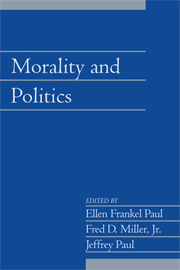Book contents
- Frontmatter
- Contents
- Introduction
- Acknowledgments
- Contributors
- What's Morality Got to Do With It? Making the Right Distinctions
- Unauthorized Humanitarian Intervention
- Thinking Constitutionally: The Problem of Deliberative Democracy
- Representing Ignorance
- Dual Citizenship and American Democracy: Patriotism, National Attachment, and National Identity
- Policy Implications of Zero Discounting: An Exploration in Politics and Morality
- Reflections on Espionage
- Mr. Pinocchio Goes to Washington: Lying in Politics
- A Subject of Distaste; An Object of Judgment
- Against Civic Schooling
- Political Morality as Convention
- Autonomy and Empathy
- God's Image and Egalitarian Politics
- Should political Liberals Be Compassionate Conservatives? Philosophical Foundations of the Faith-Based Initiative
- Index
Thinking Constitutionally: The Problem of Deliberative Democracy
Published online by Cambridge University Press: 04 August 2010
- Frontmatter
- Contents
- Introduction
- Acknowledgments
- Contributors
- What's Morality Got to Do With It? Making the Right Distinctions
- Unauthorized Humanitarian Intervention
- Thinking Constitutionally: The Problem of Deliberative Democracy
- Representing Ignorance
- Dual Citizenship and American Democracy: Patriotism, National Attachment, and National Identity
- Policy Implications of Zero Discounting: An Exploration in Politics and Morality
- Reflections on Espionage
- Mr. Pinocchio Goes to Washington: Lying in Politics
- A Subject of Distaste; An Object of Judgment
- Against Civic Schooling
- Political Morality as Convention
- Autonomy and Empathy
- God's Image and Egalitarian Politics
- Should political Liberals Be Compassionate Conservatives? Philosophical Foundations of the Faith-Based Initiative
- Index
Summary
INTRODUCTION
A variety of arguments have been advanced that deliberation should be at the center of any good political regime in which there is popular self-government. Deliberation is to be the basis for lawmaking, that is, for the making of the collectivity's binding decisions. Thus, John Rawls says, “[O]f course, actual constitutions should be designed as far as possible to make the same determinations as the ideal legislative procedure.” This procedure, in turn, is defined as having laws that result from “rational legislators … who are conscientious, trying to follow the principles of justice as their standard.” These legislators “are not to take a narrow or group-interested standpoint.” Joshua Cohen broadly agrees with Rawls and characterizes Rawls's view as one that argues for a democratic politics that is built around public deliberation. Cohen says (agreeing with Rawls) that “an ideal pluralist scheme, in which democratic politics consists of fair bargaining among groups each of which pursues its particular or sectional interest, is unsuited to a just society.” John Dryzek shares these views and comments that the “essence of democratic legitimacy should be sought … in the ability of all individuals subject to a collective decision to engage in authentic deliberation about that decision.” Others have argued along similar lines, including James Bohman, Amy Gutmann and Dennis Thompson, David Gauthier, and Jurgen Habermas.
In this essay, I want to argue that there are two temptations to avoid in theorizing about deliberation in democracy, especially when the argument concerns building a whole regime around deliberative ways of lawmaking.
- Type
- Chapter
- Information
- Morality and Politics , pp. 39 - 75Publisher: Cambridge University PressPrint publication year: 2004
- 1
- Cited by



